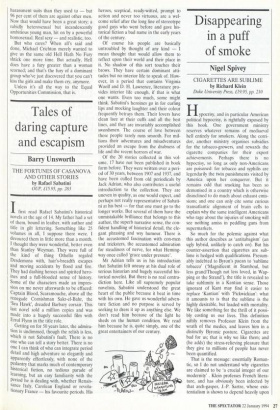Disappearing in a puff of smoke
Nigel Spivey
CIGARETTES ARE SUBLIME by Richard Klein Duke University Press, £19.95, pp. 210 Hypocrisy, and in particular American political hypocrisy, is rightfully exposed by this book. One government ministry reserves whatever remains of mediaeval hell entirely for smokers. Along the corri- dor, another ministry organises subsidies for the tobacco-growers, and rewards the cigarette companies for their export achievements. Perhaps there is no hypocrisy, so long as only non-Americans are poisoned: for tobacco and syphilis are legendarily the twin punishments visited by America upon her conqueror. But it remains odd that smoking has been so demonised in a country which is otherwise disinclined to do much about exhaust emis- sions; and one can only cite some curious transatlantic alignment of brain cells to explain why the same intelligent Americans who rage about the injuries of smoking will see nothing amiss in peddling guns from supermarkets.
So much for the polemic against what this author describes as 'antitabagism' (an ugly hybrid, unlikely to catch on). But his counter-assertion that cigarettes are sub- lime is hedged with qualifications. Presum- ably indebted to Byron's paean to 'sublime tobacco' ('Magnificent in Stamboul, but less grand/Though not less loved, in Wap- ping or the Strand'), the title is revealed to take sublimity in a Kantian sense. Those ignorant of Kant may find it easier to replace 'ICantian' with `Pickwickian': what it amounts to is that the sublime is the highly desirable, but loaded with mortality. We like something for the thrill of it possi- bly costing us our lives. This definition niftily removes Professor Klein from the wrath of the medics, and leaves him in a distinctly Byronic posture. Cigarettes are bad for us; that is why we like them; and (he adds) the stress-relieving pleasure that they give to millions of people has never been quantified.
That is the message: essentially Roman- tic, so I do not understand why cigarettes are claimed to be 'a crucial integer of our modernity' . Klein professes French litera- ture, and has obviously been infected by that arch-gasper, J.-P. Sartre, whose exis- tentialism is shown to depend heavily upon
his chain-smoking. Consequently, much vaguely intellectual jargon is used to make a book from what should have a been a pamphlet. There are some desultory sur- veys of how cigarettes punctuate literature, especially novels about wartime (In every puff there is a little taste of death, which makes cigarettes the authentic discipline of good soldiers'); and our attention is drawn to the importance of cigarettes as social tools. True: even in this current anti- smoking climate (which Klein believes a passing phase of persecution), most of us can call to mind friends who will use a cigarette like a little white baton, indispensable for conducting a truly luvvy conversation. (In case we cannot do this, there are some dull photographs here of worthy smokers, such as Vaclav Havel and Coco Chanel).
As an apology for smoking, written partly as a consolation for abandoning the habit, the book may briefly amuse those who still enjoy their fags. As a literary effort, my main regret is that it shows no awareness of De Quincey's Confessions, to which it is profoundly inferior in both style and con- tent. And it is certainly a disingenuous book: whilst allowing cigarettes the Gothic charm of hastening death, there is not a whiff of smoky halitosis, not a cough to be heard, not a yellow stain in sight. Perhaps, then, it is worth pointing out that the pub- lisher, Duke University Press, in North Carolina, was endowed by James B. Duke; and James B. Duke it was who invented the machinery for making cigarettes by the million.



















































 Previous page
Previous page